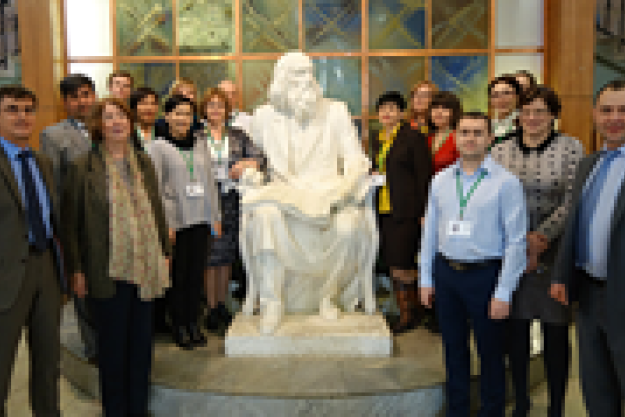
Participants taking part in the strategic planning and decision making exercise “Pyramid” Group photo of the workshop participants at the statue of D.I. Mendeleev at MUCTR
Fourteen professionals in chemistry and chemical industry from 6 Member States in Eastern Europe and Central Asia (Belarus, Kazakhstan, Kyrgyzstan, Moldova, Russia and Tajikistan) attended the Training Workshop in Russian on the Best Practices to Develop the Responsible Care ® Programmes for the Chemical Industry, which was held in Moscow Russia from 14 – 18 March 2016. This was the first initiative that the Organisation for the Prohibition of Chemical Weapons (OPCW) dedicated to the Responsible Care® – a Programme run by the European Chemical Industry Council (CEFIC), as part of the global effort by the International Council of Chemical Industries (ICCA).
The workshop commenced with the opening remarks from the Rector of the D.I. Mendeleev University of Chemical Technology of Russia (MUCTR), the President of the International Union of Pure and Applied Chemistry (IUPAC), the OPCW representative, the vice-president of the RCU, the manager of the Responsible Care® Programme at CEFIC and ICCA, and the Deputy Head of the National Authority of Russia (Ministry of Trade and Industry).
In the message conveyed from the Director-General of the OPCW, participants were encouraged to disseminate the principles the Responsible Care® Programme in their countries. Such principles are fundamental for the OPCW’s endeavour to promote the culture of safety and security at chemical facilities, as well as to mitigate chemical threats and prevent the re-emergence of chemical weapons.
The week-long training programme was aimed to raise awareness and to foster the adoption of the approaches and practices of safer and more sustainable chemistry which form an integral part of the Responsible Care® programme, such as the sound and responsible management of chemicals and their production processes, related health and environmental aspects. The programme included theoretical aspects, case studies and best practices on the implementation of the Responsible Care® Programme in specific sectors and at specific chemical enterprises. Practical exercises and interactive sessions included a business game in consensus finding for preventing environmental pollution and a strategic planning and decision making exercise for the adoption of the Responsible Care® Programme.
The workshop was also the first OPCW capacity building programme held in Russia in peaceful applications of chemistry, implemented in the framework of Article XI of the Convention. It opened a new avenue of cooperation of the OPCW with the ICCA and other institutions, which added value to the national pools of experts in relevant Member States on Responsible Care®.
Participants appreciated the high standard of the programme. They highly valued the Russia’s sharing experience in the implementation of the Responsible Care® and expressed their commitment to promote it at national levels, as well as to promote the culture of chemical safety and security and The Hague Ethical Guidelines in their countries. They also pointed out the need to continue and to further develop this training programme and other similar initiatives under the umbrella of OPCW and ICCA.
